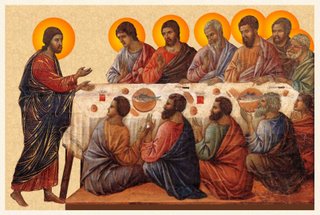The Liturgical Greeting at the Beginning of Mass
 The liturgical greeting at the beginning of the Mass forms an important part of the Introductory Rite. "By this Greeting and the people’s response, the mystery of the Church gathered together is made manifest." (GIRM, 50)
The liturgical greeting at the beginning of the Mass forms an important part of the Introductory Rite. "By this Greeting and the people’s response, the mystery of the Church gathered together is made manifest." (GIRM, 50)The greetings used in the liturgy are taken directly or draw inspiration from Sacred Scripture. The greeting 'The Lord be with you" for example is taken from the Book of Ruth 2, 4. Altering the greetings or replacing them with ones that are not scriptural or even religious is clearly an abuse. For example, some priests now have the habit of replacing the abovementioned greeting with 'The Lord is with you'. Not only is this unliturgical, it is also ungrammatical. 'The Lord is with you' is a declarative statement, not a greeting. Would you say, "The morning is pleasant." instead of, "A pleasant morning to everyone."?
Moreover, the said greeting is actually a blessing invoking the presence of the Lord upon the gathered assembly at the beginning of the celebration. Indeed, all of the liturgical greetings are in the form of a blessing repeated at the beginning of the whole liturgy as well as at the start of every major liturgical act e.g. the Gospel Proclamation and the Eucharistic Prayer, that is why so much is lost when you replace this very meaningful greeting-blessing with a banal "Good morning brothers and sisters." which carries no ritual or spiritual significance at all.
Now, some priests also have the habit of 'supplementing' the liturgical greeting with another, non-biblical, non-religious, casual greeting like 'Good morning'. Not only is this superfluous, it also seems to underestimate the power and meaning of the liturgical greeting that we have already seen. Besides, such greetings have no real place in the liturgy, not even at the beginning of homilies. They more properly belong to civic gatherings rather than liturgical assemblies.
We must understand that every form of language has its own proper use. There is language fit for casual conversation, for academic discourse, as well as for liturgical prayer.

1 Comments:
Very, very well put!
Post a Comment
Subscribe to Post Comments [Atom]
<< Home